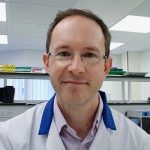
The Analytical Science Research Group (ASRG) has been awarded substantial funding from 6 successful grant applications to support a major clinical study investigating volatile organic compounds (VOCs) as diagnostic biomarkers of skin cancer.
The research will be led by Prof Richard Paul, with co-investigators: Dr Ramin Boroujerdi, Dr Santanu Majumder, Prof Huseyin Dogan, and Prof Illankovan (UHD). The project is a collaboration between BU and the Oral and Maxillofacial Surgery Unit at University Hospitals Dorset. The project aims to identify VOC biomarkers of skin cancer, and develop a rapid, portable diagnostic device tuned to detect those biomarkers, for application in primary care.
Our vision is a user friendly, rapid sensor, capable of detecting skin cancers which does not require specialist training to use. Such a device could be confidently used by a range of medical professionals in primary care, including nurses, and would enhance the detection of skin cancers.
Skin cancer sites are known to release odorous volatile organic compounds (VOCs) and these compounds can be collected and analysed to aid in the chemical profiling of skin cancers.
During a recent pilot study our team developed a custom extraction device based on a modified solid phase microextraction (SPME) approach, to capture VOCs released from skin cancer sites. Our new device enabled collection of a much wider range of compounds than previously possible. The technique was applied in a pilot clinical study with skin cancer patients.
Patients donated a VOC sample from a skin cancer lesion, as well as a sample from an area of skin not affected by cancer as a control. Volunteers from the general population served as a separate control group.
The trial demonstrated that the newly developed SPME technique was simple to apply during routine patient appointments, and polydimethylsiloxane (PDMS) SPME was found to retain a wide variety of VOCs which remained stable for a minimum of 24 hours.
Analysis using gas chromatography mass spectrometry (GC/MS) revealed VOCs that were present in skin cancer lesions that may serve as diagnostic biomarkers. The research has developed a novel, non-invasive sampling approach for VOC collection from skin cancer patients in situ, and reveals potential biomarkers associated with skin cancers.
Our latest funding will allow us to validate this approach over a major 3-year clinical study on skin cancer patients, and to undertake work to develop new portable skin cancer detection technology for use in primary care. The development of a rapid sensor, specific to skin cancers and deployable in a point of care device is an exciting prospect, which would enable rapid detection of skin cancer in primary care, enhancing patient triage and improving patient outcomes.
The Analytical Science Research Group (ASRG) at Bournemouth University provides a focus for analytical research in the Department of Life and Environmental Sciences, and a platform for collaborative work across the university and with industry.
Our research concentrates on the development of new analytical methods to deepen scientific understanding across three key themes:
- Bioanalytical Science
- Environmental Analytical Science
- Forensic Science and Toxicology
To find out more about the research undertaken by ASRG, and our technical capabilities to support chemical analysis for your own work, click here.
 The Friday Prof-ile: Richard Paul
The Friday Prof-ile: Richard Paul










 REF Code of Practice consultation is open!
REF Code of Practice consultation is open! BU Leads AI-Driven Work Package in EU Horizon SUSHEAS Project
BU Leads AI-Driven Work Package in EU Horizon SUSHEAS Project Evidence Synthesis Centre open at Kathmandu University
Evidence Synthesis Centre open at Kathmandu University Expand Your Impact: Collaboration and Networking Workshops for Researchers
Expand Your Impact: Collaboration and Networking Workshops for Researchers ECR Funding Open Call: Research Culture & Community Grant – Apply now
ECR Funding Open Call: Research Culture & Community Grant – Apply now ECR Funding Open Call: Research Culture & Community Grant – Application Deadline Friday 12 December
ECR Funding Open Call: Research Culture & Community Grant – Application Deadline Friday 12 December MSCA Postdoctoral Fellowships 2025 Call
MSCA Postdoctoral Fellowships 2025 Call ERC Advanced Grant 2025 Webinar
ERC Advanced Grant 2025 Webinar Update on UKRO services
Update on UKRO services European research project exploring use of ‘virtual twins’ to better manage metabolic associated fatty liver disease
European research project exploring use of ‘virtual twins’ to better manage metabolic associated fatty liver disease